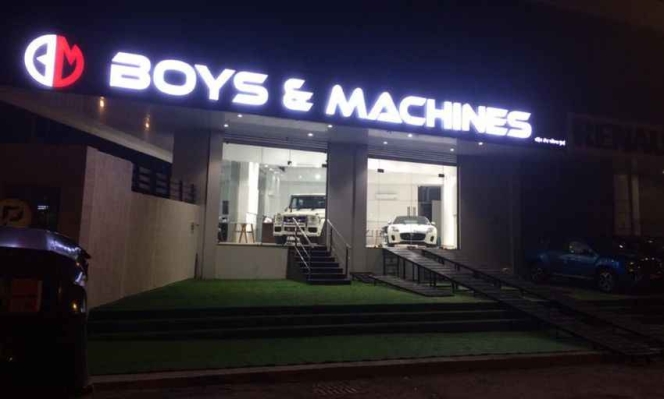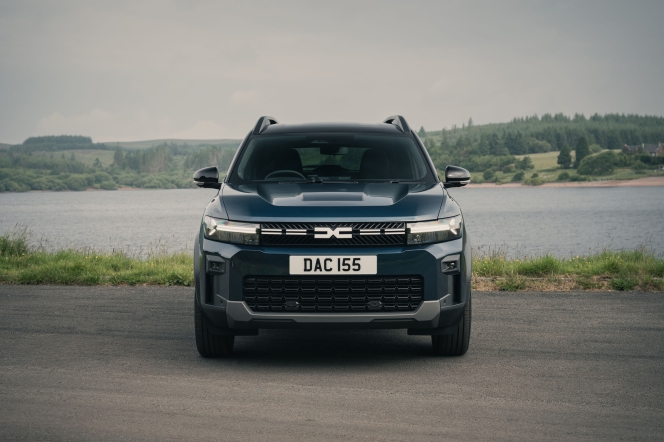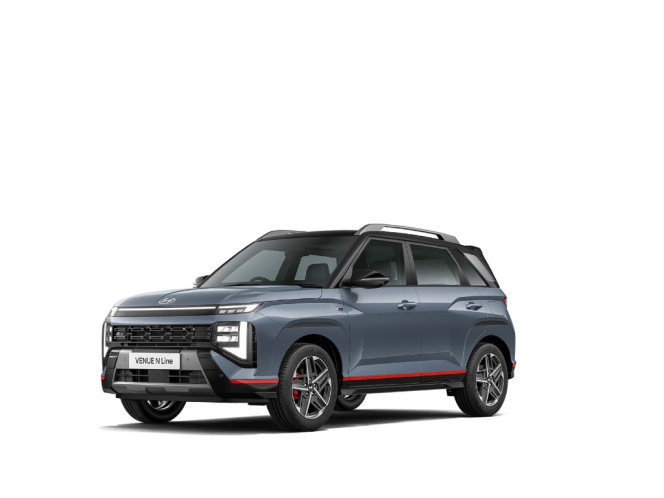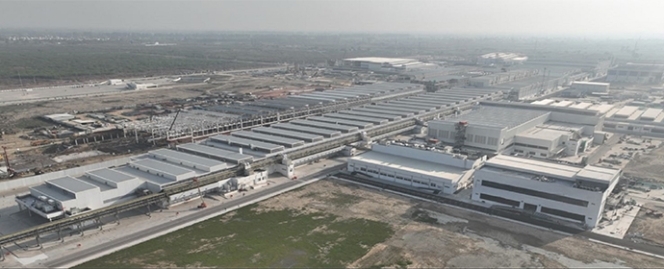Boys And Machines: The Newest Premium Car Re-Seller
- By Venkatesh P Koushik
- May 10, 2021

Founded in October 2020 by motorhead and ex-racer Siddharth Chaturvedi, Boys and Machines aims to create an image of quality, reliability, ethical values and long-term relationship with the customers and business partners in the pre-owned luxury car market in India.

A car collector for a long time, Chaturvedi realised that collecting cars was an expensive hobby with the high depreciation rates attached to premium cars. This realisation gave him the idea to convert his hobby into a business to maintain his passion for cars and make money. Once that plan was in place, Chaturvedi started to understand the business of premium car resale and scouted around to pick up the right people into his team to start this venture.
After finding the team, he finally started the new business venture in October 2020, when the market had recovered from the effects of the pandemic and started getting back to normal. The pandemic had injected a fresh thought into people’s head with evident uncertainty of the future. According to Chaturvedi, post the lockdown last year, the spending nature of people has changed, and instead of waiting for the future, people have started to live their dreams. This gave Boys and Machines the perfect opportunity to enter the market and capitalise on people’s spending power.
When asked to explain the business model of Boys and Machines, Chaturvedi said, “As for the business model, we work pan India online majorly. We try getting the cars at the best possible price and conditions across India and offer them to our customers at a slightly lesser rate than the market prices.”
Boys and Machines focuses on two things while buying and selling cars – first, finding the right quality product at the right price and second, providing a hassle-free payment method by closing the deal at one go. This practice builds a strong relationship with the sellers and buyers and helps the brand have a better bargain position.
However, selecting the right car is critical for the business. Boys and Machines has created a robust three-step verification process. In the first step, the team scouts for cars around the country. On finding a car of their choice, details like chassis number, engine number and other vital information of the vehicle are shared with the respective OEM dealerships, which conduct a background check and provide information on the status and service history of the vehicle. This is the first seal of approval.
Once the car history is verified, the details are passed on to the insurance company, which helps verify any repair work or claims done on the car outside the dealership. If the vehicle passes this step, the company sends its trained staff to the vehicle’s location for physical inspection and approval. Once the vehicle passes all three stages, a meeting is set up with the owner, and the deal is closed in one go without any hassle.
This verification system gives Boys and Machines a competitive advantage while selecting a car as no details about the car can be manipulated.

When we asked how one determines the correct price of any car, Chaturvedi explained, “There is no fixed formula. It is based on the market condition, availability of the product and the demand for the product. These are the conditions that determine the price of a vehicle”.
Buying and stocking premium cars for sale is an expensive business, so we asked Chaturvedi about the financial setup in the company and its stockholding pattern. He replied, “Typically, we stock about 30-35 at any given point. Based on the ongoing trend and the vehicle availability, we try to find a customer for a car than a car for a customer”.
e then explained that the cars in demand are hard to come by. The ones that are listed on the market ask an exorbitant amount of money to purchase. “So, if one starts scouting only for cars in demand, one can hardly sell around five cars in a year. So instead of looking for cars in demand, resellers understand the needs of the market and stock vehicles accordingly.”
For instance, the market in Mumbai is highly SUV centric. Constant flooding and waterlogging problems have pushed car users to adapt to SUVs. So, based on the need, Boys and Machines stocks SUVs from different OEMs. However, the market in Delhi is different to the market in the west of India. In Delhi, people prefer to be driven around than driving around. So, this calls for stocking of both sedans and SUVs that offer an excellent chauffeur-driven experience.
The market in Hyderabad is a hotspot for sports cars, while the eastern market is highly unpredictable. Hence, these variations do not allow the company to stock cars hailing from a single brand or category.
Premium car service is also an expensive affair. Boys and Machines has solved this problem for its clientele with a dedicated customer service team. The business offers breakdown assistance anywhere in the country along with six months of engine and transmission warranty.
The brand also offers a fixed buy-back option on every car sold at a rate of 25 percent depreciation a year. The buy-back price is decided on the day of the purchase, and customers can come back to the showroom after one year and exchange their car at the pre-determined price.
These small steps go a long way in building customer confidence and aids Boys and Machines in retaining 100 percent of its clientele. Also, word of mouth is a significant marketing source that helps the brand name reach a larger audience.
Talking about the expansion plans for Boys and Machines, the managing director explained that they are on course to inaugurate eight outlets by the end of the year. At the moment, there are three working outlets in Gurugram, Mumbai and Kolkata. The fourth one in Hyderabad is ready to be opened, but the launch has been postponed due to the ongoing COVID situation and the subsequent lockdown. The other cities selected are Indore, Ahmedabad, Chandigarh and Goa.
Intrigued by the choice of cities for its showroom launch, we asked Chaturvedi what the critical considerations are for opening a showroom. Explaining the business preference, he said that Delhi and Mumbai were the default selection for opening a showroom based on the intense demand and spending power of people in these regions. Boys and Machines selected Kolkata as a gateway to the east, helping it tap into this new market and utilise the lower RTO tax in the region.
Bengaluru and Hyderabad were the brand’s options for opening its fourth showroom. Keeping in mind the saturation of the Bengaluru market and observing the recent boom in sports car demand in Hyderabad, the company decided to settle with Hyderabad and tap this growing market’s massive demand for sports cars.
 After the first round of selection of the city, the company observed two things: the surge in real estate in the region and the rate of sale of premium cars in the area. “Cities that start to buy new cars, which are at almost twice the price of a used one, means the aspiration of people there is high. The prospect of buying a higher tier used car at the price of a brand-new premium car helps meet the aspiration of many in the region. These factors help us decide the next region for starting our business,” Chaturvedi added.
After the first round of selection of the city, the company observed two things: the surge in real estate in the region and the rate of sale of premium cars in the area. “Cities that start to buy new cars, which are at almost twice the price of a used one, means the aspiration of people there is high. The prospect of buying a higher tier used car at the price of a brand-new premium car helps meet the aspiration of many in the region. These factors help us decide the next region for starting our business,” Chaturvedi added.
He also revealed the company’s ongoing negotiations with external suppliers to help import cars previously not available in the Indian market from countries like Japan, US and more. He mentioned that the high import duties and the challenging import process are the hurdles that have pushed many players away from importing new and unique products into the market.
He also spoke about the challenges from the market’s unorganised players, especially in the 20-40 lakh price bracket. However, he clarified that this is more of a teething problem in North India as compared to the Southern regions because the North people tend to purchase eight-year-old cars costing more than a crore at just 25-30 lakh, while in the South, people don’t seem to mind spending a lakh or two more on a well-rounded package that offers them peace of mind.
When asked about the challenges the second wave of the pandemic has posed, he said, “The biggest challenge right now is the pandemic. We don’t know when the market opens and what the people’s emotions will be as the second wave has been more deadly or more impactful to everyone from the first wave. So, as of now, the biggest hurdle would be how the country recovers after pandemic and how difficult will it be to find the right product for the buyers”.
On the future plans, he said that the company plans to have a turnover of around 100 crores with approximately seven to eight percent profit margin. (MT)
Dacia Rolls Out 100,000th Bigster In Just One Year
- By MT Bureau
- February 05, 2026

Renault Group-owned European car brand Dacia has achieved a significant milestone with the rollout of the 100,000th Bigster just one year after its production began at the Mioveni facility in Romania. This impressive volume highlights the immediate and substantial demand for the brand's latest model. Even prior to its full market launch, the vehicle garnered over 13,000 pre-orders, signalling strong early interest in its proposition of a value-oriented, family-sized SUV.
The model swiftly translated this initial promise into market leadership, becoming the best-selling C-SUV to retail customers across Europe in the second half of 2025. This commercial success is mirrored in the United Kingdom, where close to 5,000 orders have been recorded. British buyers have shown a distinct preference for the efficient hybrid 155 powertrain and the generously specified Journey trim level, with Indigo Blue being the colour of choice.
Beyond sales figures, the Bigster's impact has been validated by influential industry awards, most recently at the 2026 What Car? Car of the Year Awards, where it was hailed as a definitive value champion. Designed to challenge the status quo, the Dacia Bigster, starting from GBP 25,215, successfully delivers a robust, well-equipped and practical solution for families, firmly establishing its successful position in the competitive automotive landscape.
Hyundai Motor India Reports INR 123 Billion Profit In Q3 FY2026
- By MT Bureau
- February 02, 2026

Hyundai Motor India (HMIL) has released its unaudited financial results for Q3 FY2026 and nine months ending 31 December 2025.
The company reported a Profit After Tax (PAT) of INR 123.44 billion for Q3, representing a 6.3 percent increase YoY. Revenue for the quarter reached INR 1,797.35 billion, up 8 percent compared to the same period last year. EBITDA stood at INR 2,018.3 billion, a 7.6 percent rise, supported by festive demand and the implementation of GST 2.0.
The company stated that the domestic demand was supported by wholesale volumes increasing 5 percent QoQ. The Hyundai Creta recorded sales of over 200,000 units in the 2025 calendar year, while the new Venue model has received nearly 80,000 bookings to date.
Hyundai Motor India also entered the commercial mobility segment with the Prime HB and SD taxi models. Exports grew by 21 percent YoY in Q3 FY26, accounting for 25 percent of the total sales mix.
For the nine-month period, EBITDA reached INR 6,632.5 billion, a 3.3 percent increase. EBITDA margins expanded to 12.8 percent, up from 12.5 percent in the previous year, despite costs related to capacity stabilisation and commodity prices.
Tarun Garg, Managing Director & Chief Executive Officer, said, “The third quarter performance underscores our resilience and strong execution of 'Quality of Growth' strategy, marked by healthy growth in volumes, revenue and profitability. Notably on a year-to-date basis, EBITDA margins expanded to 12.8 percent as against 12.5 percent last year, supported by our efforts towards improving sales mix and prudent cost control measures. As we move ahead, the robust January’26 sales number gives us great momentum towards a healthy 2026.”
|
Particulars |
Q3 FY26 |
Q2 FY26 |
Q3 FY25 |
9M FY26 |
9M FY25 |
|
Revenue |
179,735 |
174,608 |
166,480 |
518,472 |
512,526 |
|
EBITDA |
20,183 |
24,289 |
18,755 |
66,325 |
64,211 |
|
EBITDA % |
11.2% |
13.9% |
11.3% |
12.8% |
12.5% |
|
PAT |
12,344 |
15,723 |
11,607 |
41,759 |
40,259 |
Jeep Reaffirms India Commitment With Strategic Plan Jeep 2.0
- By MT Bureau
- February 02, 2026

Stellantis-owned Jeep has announced its Strategic Plan Jeep 2.0, positioning India as a central hub for its operations in the Asia Pacific region. The plan focuses on localisation, manufacturing depth, and export expansion from the company's facility in Ranjangaon, Pune.
As part of the strategy, Jeep intends to increase localisation levels to 90 percent, up from the current 65–70 percent. This move is aimed at strengthening supply-chain resilience and cost competitiveness. The Ranjangaon plant, which has an annual capacity of 160,000 vehicles, currently exports the Compass, Meridian, and Commander to markets including Japan, Australia and New Zealand. Plans are underway to expand exports to Africa and North America.
The company plans to introduce a new vehicle lineup in India starting from 2027. In the interim, Jeep will maintain its current portfolio through refreshes and special editions. To support its customers, the brand has introduced the Confidence 7 programme, which includes a buyback scheme, pre-maintenance packages, and extended warranties.
At present, Jeep operates over 85 sales and service touchpoints across 70 cities in India. The automaker stated that in 2025, the Wrangler Willys 41 limited edition sold out within seven days. The company is also focusing on its owner community, which has reached 100,000 members, through experiential platforms and brand clubs.
Shailesh Hazela, CEO & Managing Director, Stellantis India, said, “Jeep’s 85-year legacy is built on authenticity and adventure. Strategic Plan Jeep 2.0 lays out how we will sharpen our product strategy and strengthen the customer experience year after year, driven by deeper localisation, global product alignment, expanding our vehicle offerings, and programs that deliver real value. We are equally focused on taking care of our existing customers, ensuring they receive the support, service and confidence they expect from Jeep. Success in India demands resilience and long-term commitment and we are investing with that clarity to ensure Jeep remains a brand of pride and desirability.”
Maruti Suzuki India Reports INR 37.94 Net Profit For Q3 FY2026
- By MT Bureau
- January 28, 2026

Maruti Suzuki India, the country’s largest passenger vehicle manufacturer, has reported its financial results for Q3 FY2026.
The company reported revenue of INR 475.344 billion, as against INR 368.02 billion last year, net profit came at INR 37.94 billion, as against INR 36.59 billion last year. It is to be noted that the net profit was impacted for Q3 FY2026 was impacted due to a one-time provision of INR 5,939 million relating to new Labour Codes.
During the period, the company achieved its highest quarterly domestic sales of 564,669 units, an increase of 97,676 units over the previous year. Total sales reached 667,769 units, which included 103,100 units in exports. This performance was supported by a recovery in the car market following GST reform, with the small car segment in the 18 percent GST bracket contributing significantly to the volume increase.
For the nine-month period from April to December 2025, the company recorded its highest sales volume, net sales and net profit. Total sales volume reached 1,746,504 units, with domestic sales at 1,435,945 units and exports at 310,559 units. Net sales for this period increased to INR 1,242 billion, while net profit grew to INR 1,085 billion.
Financial statements for the period have been restated following the amalgamation of Suzuki Motor Gujarat (SMG) with MSIL. This process took effect from 1 April 2025. The company continues to monitor market conditions as it manages its manufacturing and sales operations.
The recovery in the car market was led by the small car segment. Sales growth in this category accounted for 68,328 units of the total domestic increase. The company remains focused on domestic and export markets to maintain its sales volumes.







Comments (0)
ADD COMMENT